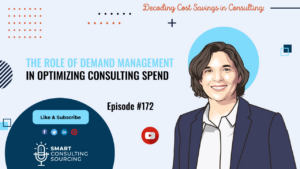Hello and welcome back to Smart Consulting Sourcing, the only podcast about consulting procurement.
I am Hélène, and today we will be talking about Social Responsibility and Consulting Sourcing. However, before that, let me give a recap of last week’s podcast.
Management consulting is an intriguing industry. While most of the clients are already or are becoming part of global corporations, the consulting sector remains scattered.
As our global directory of consulting firms, conavigo.com shows, about two-thirds of companies have less than ten employees. Even though it is not unusual for those firms to send consultants overseas, it becomes challenging to establish their presence abroad.
North America and Europe’s more mature consulting markets are concentrating on digitization, innovation, marketing and sales, technology, and operational improvements today.
Emerging markets and the rest of the globe provide exciting potential, with a higher pace of development than developed markets, but each nation and area have unique problems. It remains to be seen what the future holds for both consultants and clients.
Listen to the complete podcast about The Consulting Industry in Emerging Markets.
This week, I want to discuss about Social Responsibility & Consulting Sourcing.
Corporate Social Responsibility has become a critical aspect of any business, globally with many firms – large and small – addressing it directly and methodically. This is why global sustainability registries, such as the Global 100 Most Sustainable Corporations in the World, prioritize foreign corporations.
CSR refers to a company’s behavior, governance, and transparency in crucial social, environmental, and business sectors in broad terms. It all comes down to taking into account the full impact of a company’s activities on all stakeholders.
It’s about ensuring that organizations function responsibly, take a leadership role in the community and social issues that influence their operations (including those of their supply network), and therefore are transparent about their actions in such areas.
According to the ‘triple bottom line reporting,’ or ‘the triple bottom line ’principle, a firm must be accountable for both its financial, social, and sustainability reporting.
The CIPS refers to CSR practices in procurement as “Socially Responsible Procurement” (SRP) since it focuses on how to achieve excellent social and environmental performance in the supply chain. Many of organizations (of all sizes) are beginning to see the need of tackling core SRP concerns.
The Significance of Corporate Social Responsibility
Social Responsibility is the practice of incorporating social, economic, and environmental issues into an organization’s procurement processes and procedures, in addition to traditional price and quality considerations.
Effective sustainable procurement is important because it shows that a company is committed to its goal and is building a reputation and confidence among its target customers and partners. The advantages of sustainable procurement may be broken down into the following four categories:
The first one being, Risk and Reputation – A supplier relationship with a company that engages in unethical practices such as child labor or pollution can have a financial and reputational impact on the company.
The Second point is Cost Reduction – Long-term procurement partners should avoid cost increases caused by ownership transfers and energy use. Cost reductions enable an organization to reinvest in itself.
The Revenue Growth – Consumers that buy into sustainability can improve organizations’ financials and increase brand equity and loyalty. An organization can also save money by using sustainable procurement partners.
Last but not the least, Future Proofing – By developing sustainable procurement practices, an organization may future-proof itself against supply shortages and changes in social, economic, and environmental issues. And we see in recent times between the pandemic and the war threats that it can become very important.
Did you know? Clients have the power to shape the consulting industry!
Due to the increased pressure on OPEX, client companies are now examining their spending to identify areas where they may save money. And consulting, which falls under the indirect category and can account for up to 3% of revenue, appears to be an obvious target.
Many CEOs may be tempted to go after the cost base using classic cost-cutting tactics and pricing discussions.
When clients pressure boutique consulting firms during negotiations or buy exclusively from tier 1 consulting firms because they don’t have the time to explore the market or drive proper risk analysis, they accelerate the destruction of the low- and middle-market.
And this move will come back to bite them in the short or midterm.
Boutiques and mid-sized companies will close down or be acquired by more prominent players. The supply side will consolidate, strengthen the large players’ positions, and increase their bargaining power.
As a result, the prices will go up. And the diversity, flexibility, and depth of expertise that more specialized consulting firms were bringing to the table will be drowned in the large firms’ talent pools.
After a while, as the barrier to entry is low, most small consultancies will resurface in some shape under a different name, but there will be a lot to catch up.
This brings us to ask the question – how do you buy consulting as a socially responsible client?
You, the clients. have the levers to be on the winning side in the short and the long term.
First thing, you need to inject healthy competition into your consulting procurement. What do I mean by healthy competition?
That’s a competition where all the candidates have a fair chance to win the project. Organizing a competition without inviting relevant consulting suppliers and putting all the suppliers in the right conditions is just a waste of time and money. And ultimately, it will hurt your reputation as a client.
Second thing, you need to give them some visibility. So this is only interesting with your regular suppliers. But if you have anticipated your needs, and built a list of preferred or strategic suppliers, you can secure much lower rates.
Because consultants will almost always exchange a few margin points with the assurance to staff their teams.
Some of you might think. Well, that’s the business jungle. Consulting firms are born and die every year. There will always be a replacement that we can work with. This is very true in a commodity market, which consulting is not.
The knowledge, and in fact the people, behind a given firm might retire, get hired by another consulting firm, or worse by your competition.
In Conclusion,
Organizations that can demonstrate strong sustainable sourcing and social responsibility credentials can gain a competitive edge, improve their brand, and increase client, investor, and consumer trust.
Social responsibility is something that would be beneficial for everyone like clients, society, and organizations. Social Responsibility and PR go hand in hand because doing a good deed and getting the word out into the community is what makes it work!
In the consulting industry, socially responsible clients will have better deals, better relationships with their consultants, and therefore better results. And at the end of the day, didn’t you hire consultants to improve the impact of your projects?
And that marks the end of our podcast, folks. Next week, I want to talk about Why is the French government spending so much money on management consulting? It will be an open mic with my co-founder, Laurent Thomas. So, stay tuned.
Till then, stay safe and happy sourcing!
If you have other questions about social responsibility and consulting sourcing, remember you can contact me directly on LinkedIn or by email because I am always game for a chat!
Bye and see you next week! Au revoir!







